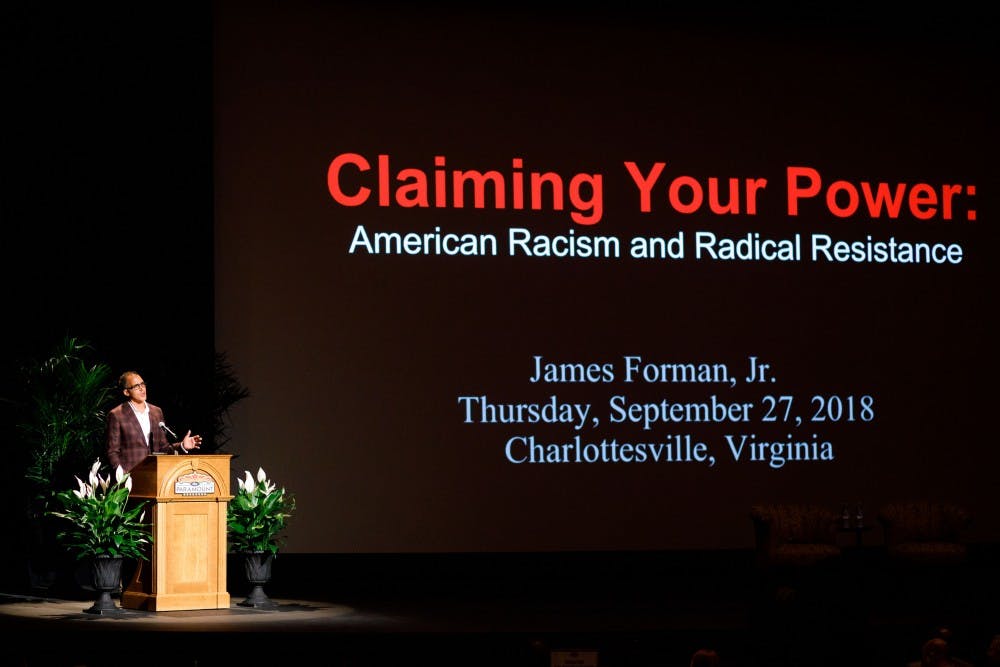James Forman Jr. — an author, scholar and Yale Law School professor — spoke about the myths and history of black criminality in America at the Paramount Theater in downtown Charlottesville Thursday evening.
This event, titled “Claiming Your Power: American Racism and Radical Resistance,” featured a talk from Forman, a conversation panel with University President Jim Ryan and a question-and-answer panel with the audience.
Forman’s book titled “Locking Up Our Own: Crime and Punishment in Black America” has been listed as one of the New York Times’ 10 Best Books of 2017, and has been awarded the 2018 Pulitzer Prize for General Nonfiction.
Foreman based the majority of his talk on providing historical background to myths involving black criminality, and the ways through which society can address these issues to promote social change and justice.
Forman’s father was a civil rights activist who marched with civil rights activist Dr. Martin Luther King and served as an instrumental leader for organizations fighting for justice and civil rights, including the Student Nonviolent Coordinating Committee, where he served as executive secretary.
Through the teachings of his parents and his upbringing in Georgia — a state where he witnessed watching the Confederate-symbolized flag in school every day — Forman became increasingly interested in researching history as it pertains to issues today. He said that through the trials faced during his parent’s generation, many issues prevalent then have yet to be fully examined today.
“Their generation, their generation’s activism, their generations courage to face the violence — they changed and transformed America in ways that we have yet to and so far we haven’t fully acknowledged,” Forman said.
Forman also gave a historical timeline on the perspectives of those who advocated for slavery, and the reoccuring myths on why slavery was once acceptable in America. Such myths included perspectives on the care of black children, their alleged incapability of learning and the idea that slavery was necessary to restrain them of their criminal impulses.
Forman explained how such myths grow within us, and everyone has lived with these claims in their life.
“These explanations, these rationalizations, those become the myths and the lies that a racist society depends on,” Forman said. “And the myths don’t die easily … the lies linger in our consciousness, in our societal DNA, and all of us — people of all color and orientations have lived with these claims.”
Forman also explained the effects of these myths, such as affecting the legal system for black individuals. For example, in pre-Civil War Virginia, there were 73 accounted crimes that led to the death penalty for slaves, while only one account for white individuals.
“These claims about black criminality, did more than just justify slavery, it also laid a foundation for a legal system that was harder on blacks.” Forman said.
In efforts to “reclaim our power,” Forman told the audience that they must continuously form relationships and hold one another accountable for our actions.
“I believe that fundamentally seeking to build relationships on trust and consistency and accountability, that is what’s going to take to make meaningful, social change possible.” Foreman said.
Before Forman spoke, a performance of spoken word was given by Asst. Prof. of Hip-Hop and the Global South, A.D Carson. Before he began, Carson gave the reasoning and importance behind his work.
“It’s about identity … black embodiment, disembodiment, literature, performance, and as I tell my students all the time, making arguments,” Carson said.
Jocelyn Willoughby, a third-year College student was invited to the event on behalf of the Student Athletic Advisory Committee. After attending the event, Willoughby said Forman’s talk allowed her to better understand the importance of history.
“We are often taught false historical narratives that are used to mask the historical abuse and oppression of people,” Willoughby said. “However, it is important to be critical of the history we consume and acknowledge the truth.”
After Forman’s talk, he sat down to begin an open conversation with Ryan. Both Ryan and Forman worked at the Maya Angelou Public Charter School, co-founded by Forman in 1997.
Among other questions, Ryan asked Forman whether he believes America has progressed in terms of racial equity. Forman said there have been improvements, but that there is still work to be done.
“We live in a moment where opportunities for some African-Americans are unparalleled in American history and alongside that, we live in a moment of incredible division,” Forman said.







